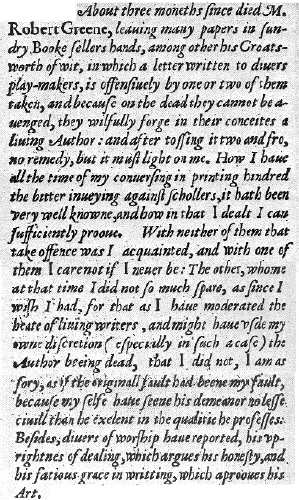The attack retracted
A Groats-worth of Witte was seen through the press by a friend of Greene's, Henry Chettle; evidently, the pamphlet caused such a stir that Chettle's Kind-Harts Dreame (1592), published a few months later, included a reference to the controversy. He begins by describing the circumstances, and an apparent attack on him (since Greene was dead); he continues by defending his record, and ends with an apology.
About three moneths since died M. Robert Greene, leauing
many papers in sundry Booke sellers hands, among other his
Groatsworth of wit, in which a letter written to diuers
play-makers, is offensively by one or two of them taken, and
because on the dead they cannot be auenged, they wilfully
forge in their conceites a liuing Author: and after tossing
it two and fro, no remedy, but it must light on me. How I
haue all the time of my conuersing in printing hindred the
bitter inueying against schollers, it hath been very well
knowne, and how in that I dealt I can sufficiently prooue.
With neither of them that take offence was I acquainted, and
with one of them I care not if I neuer be: The other, whome
at that time I did not so much spare as since I wish I had,
for that as I have moderated the heate of liuing writers, and
might have vsed my owne discretion (especially in such a
case) the Author being dead, that I did not, I am as sory, as
if the originall fault had beene my fault, because my selfe
haue seene his demeanor no lesse ciuil than he excelent in
the qualitie he professes. Besides, diuers of worship have
reported, his vprightnes of dealing, which argues his
honesty, and his fatious grace in writting, which approues
his Art.
From Kind-Harts Dreame (1592).
Shakespeare had defenders of some status-- "of worship." The one word which describes the actual work of the young Shakespeare, "facetious," sounds faint praise to modern ears, but to Chettle it probably meant something more like "witty," "polished," or "fluent."
If the last meaning is the one he intended, it is the first mention of a quality of Shakespeare as writer which has not always been seen as admirable, the apparent ease and rapidity with which he wrote.
